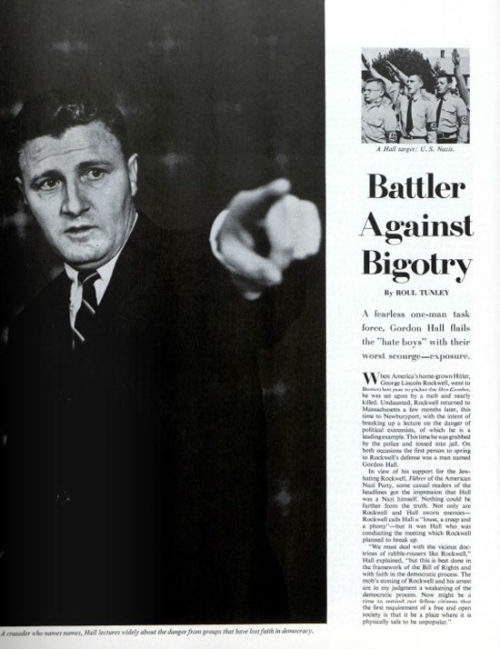A One-Man Crusade Against Bigotry
Since November of last year, the Southern Poverty Law Center has reported over a thousand acts of assault or intimidation against minorities. Just since January, 73 Jewish community centers in 30 states have received bomb threats. News of attacks on immigrants, spray-painted swastikas, and racist rants on the internet are becoming a regular part of the news.
Americans who dread the rise of extremism in this country might feel helpless, that turning back bigotry and violence requires more financial backing and resources than they can muster.
But Gordon Hall has proved that one individual can make an enormous difference.
For 40 years, he single-handedly fought back against extremists and hate groups on both the right and left edges of the political spectrum. Beginning in the early 1950s, Hall exposed the lies and hidden agendas of these groups through thousands of speeches delivered at colleges, churches, businesses, and professional organizations.
Hall took an unlikely route to his unusual calling of denouncing extremists. Raised in poverty during the depths of the Depression, he left his home and formal education when he was 14. Drafted into the Army in 1942, he realized how little he knew about the world and politics. He was angered by communist sympathizers in the Army who challenged his faith in the country. And back in the civilian work force, he was equally outraged to find strains of anti-Semitic fascism in co-workers.
Frustrated by these anti-democratic messages from these extremists, Hall worked with a group of like-minded moderates called Friends of Democracy. He attended public meetings of hate groups, gathered their information, and learned who their members were.
When the Friends of Democracy disbanded in 1951, Hall became a self-employed speaker who traveled the country exposing the extremist threat to the American way of life. He believed that lies, fears, and bigotry shouldn’t be ignored or suppressed. They needed to be publicly exposed so Americans knew what they represented.But Hall was not rigid in his condemnation; he distinguished between liberals and conservatives on one hand and extremists on the other. The former had faith in the country and its potential. Extremists had lost their faith, hated the system, and sought violent disruption of society.
Above all, though, Hall believed fervently in the American rule of law. On two occasions, he even came to the defense of a notorious American Nazi because he felt the man’s extremist views were best managed “in the framework of the Bill of Rights and with faith in the democratic process.”
“Battler Against Bigotry,” which appeared in the December 8, 1962, issue of the Post, brought Hall valuable publicity. It led to further media exposure and an interview with Walter Cronkite on his TV show The Twentieth Century.
Hall continued to speak up in defense of democratic principles for 40 years before finally retiring. Although another Gordon Hall is needed now more than ever, no one has yet stepped into his place.

Featured image: Photo by Milton Feinberg for “Battler Against Bigotry” from the December 8, 1962, issue of the Post.